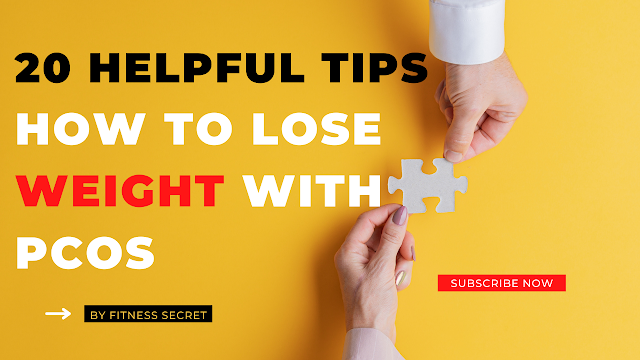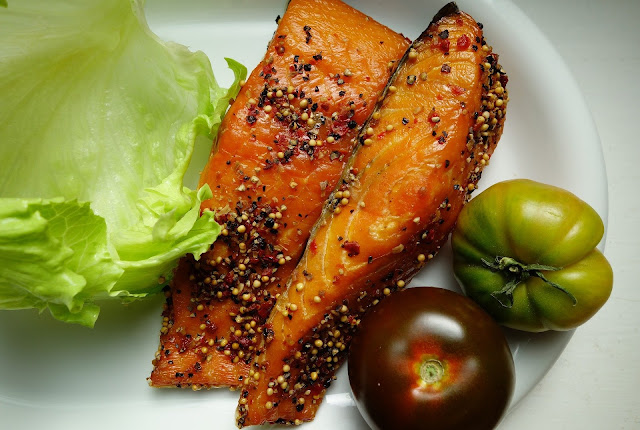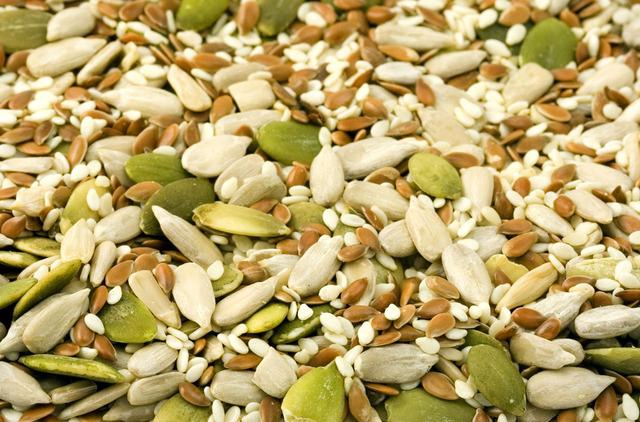You're in luck if you're wondering how to lose weight with PCOS.
I've compiled a list of the top 20 weight-loss tips for people with PCOS.
I go into further detail about some of the more beneficial ones, such as exercising and eating protein, but all of these suggestions will help you get closer to your weight-loss goals.
Table of Content:
What Does PCOS Mean?
How To Lose Weight With PCOS – Must Try This 20 Helpful Tips
1. Eat Protein
2. Reduce Your Carb Intake
3. Eat Healthy Fats
4. Eat Fatty Fish Weekly, And Add Cod Liver Oil To Your Diet
5. Start Getting Active
6. Eat More Fibrous Foods
7. Eat More Low Glycemic Foods
8. Eat Nutrient-Dense Foods
9. Eat Plenty Of Protein
10. Drink Green Tea Or Other Green Tea Drinks
11. Eat Foods That Are Rich In Folic Acid
12. Practice Yoga
Yoga
Meditation
Hatha Yoga
Pilates
HIIT
13. Eat Foods That Can Increase Insulin Sensitivity
Fatty Acids Omega-3
Leafy Green Vegetables
Avocado
Aloe Vera
Black Beans
Oatmeal
Quinoa
Breast of Turkey
How to Drop Pounds While Taking Metformin
Controlling Blood Sugar
Bloating is reduced.
14. Sleep 7-8 hours
15. Exercise
16. Stretch More Often
17. Eat More Omega-3s
18. Eat More Nuts and Seeds
19. Take a Multi-Vitamin
20. Reduce Stress Levels
Final Thoughts on How To Lose Weight With PCOS
Frequently Asked Questions
First of All What Does PCOS Mean?
Polycystic Ovary Syndrome, or PCOS, is a hormonal disorder that affects up to one in every five women.
Losing weight with PCOS might be tough depending on how severe it is and what symptoms you have.
It may even be impossible for some.
These strategies, on the other hand, will help you lose weight with PCOS while also gently increasing your metabolism so you don't feel hungry all day.
First and foremost, let's go through the fundamentals.
PCOS occurs when your body's levels of androgens (hormones like testosterone) are abnormally high.
Weight gain, unwanted hair growth, acne, and irregular or absent periods are just a few of the unattractive symptoms that can occur as a result of this.
It is feasible to lose weight if you have PCOS, but it will take more effort than simply limiting calories and going to the gym for 30 minutes every day.
So, without further ado, here are the top 20 weight-loss tips for people with PCOS.
Weight gain, unwanted hair growth, acne, and irregular or absent periods are just a few of the unattractive symptoms that can occur as a result of this.
It is feasible to lose weight if you have PCOS, but it will take more effort than simply limiting calories and going to the gym for 30 minutes every day.
So, without further ado, here are the top 20 weight-loss recommendations for people with PCOS.
How To Lose Weight With PCOS – Must Try This 20 Helpful Tips
1. Eat Protein For Oestrogen Reduction
There is a mountain of evidence relating high-protein diets to weight loss and oestrogen reduction.
The purpose of eating protein is to minimise the number of excess androgens (hormones like testosterone) in your body.
Because these steroids cause you to retain water and keep you hungry, you will overeat and gain weight.
You can reduce appetite and encourage weight loss by consuming more protein and reducing excess water retention.
Here are some suggestions to assist you:
Consume high-protein foods including chicken, steak, fish, avocados, almonds, eggs, and dairy products.
2. Reduce Your Carb Intake
To keep your blood sugar in check, you should cut back on carbs.
This is due to an enzyme known as PRKAR1a, or AMP-activated protein kinase.
You can acquire adequate nutrients for your body without having too many carbohydrates in your system, which normally results in excessive insulin if you reduce this enzyme.
You'll minimise the amount of testosterone produced by consuming fewer carbs, resulting in less excess oestrogen.
To get rid of excess water retention, you must eliminate the excess carbs that cause it.
3. Eat Healthy Fats
It's also crucial to start consuming healthy fats now that you're eating fewer carbs.
Because fat is necessary for good health, it's best to consume only the type of fat you require.
Here are some healthy fat examples:
Avocado oil is a type of oil that comes from (and its healthy fat cousins like almond oil, flaxseed oil, and macadamias).
Walnuts
Macadamias
Seeds of sesame
Coconut oil is a type of vegetable oil that is (food grade)
Nut oils that haven't been refined
Coconut milk is a delicious dairy product.
Mackerel
Olive oil, canola oil, and hemp oil are examples of unprocessed oils.
Borage Seed Oil is a superfood that has the same health advantages as almonds and pecans while also aiding weight loss. It contains one of the highest concentrations of GLA (gamma-linolenic acid), a beneficial omega-6 fatty acid.
Also Read: The Benefits of Starting Your Day with a Walk - Fitness Secret
4. Eat Fatty Fish, And Add Cod Liver Oil To Your Diet
Omega-3s, which are abundant in fatty fish, are extremely beneficial to your health.
It also lowers your chances of getting heart disease, cancer, and other illnesses.
Because salmon includes a lot of omega-6 fatty acids, it's important to limit yourself to eating it once or twice a month.
Here are a couple more examples:
COD
Sablefish or black cod,
Herring
Anchovies
Mackerel (Spanish or King).
Sardines
Tuna
5. Start Getting Active (Exercising)
One of the most basic truths of losing weight with PCOS is that you must begin exercising.
"But I've tried exercising previously and nothing worked!" I know you're thinking.
One or more of the following factors are likely to blame for your lack of workout success:
You didn't combine strength and cardio training.
Cardio alone will not help you lose weight.
This is why.
You didn't consume enough protein before the event.
Protein helps to suppress your appetite, so you'll be less hungry during and after your workout.
You didn't eat immediately following your workout.
Following exercise, you'll need this recovery period to replace your glycogen stores (the body's primary type of glucose storage).
Here are some suggestions for how to lose weight with PCOS if you need some help getting into the habit of exercising:
One of the most efficient strategies to lose weight is to strength train. Gym time is also a great way to meet new people and create new friends.
Do some cardio: Cardio activity not only burns fat, but also speeds up your metabolism, allowing you to lose weight more quickly.
Cardio should be done after weight training, while your muscles are still hot (even if you're well-rested).
Perform cardio first thing in the morning, while you're still wary.
6. Eat More Fibrous Foods
Because fibrous vegetables, fruits, and grains have a high water content, it's difficult to consume too much of them.
This will make you feel fuller and help you maintain a healthy weight.
I've given a few examples of fibrous meals below:
Berries, grapefruit, lemons, limes, and other citrus fruits.
Broccoli, spinach, kale, and other vegetables.
Quinoa or oats are examples of grains.
Bread made using sprouted grains. Fibre comes from the wheat germ or bran in sprouted grain bread.
Beans and lentils are legumes. Lentils are also a high-protein food.
7. Eat More Low Glycemic Foods
Foods with a high glycemic index are those that are quickly digested by the intestines, causing an insulin rise.
If you have PCOS, this is bad because insulin encourages the ovaries to produce steroid hormones, which causes water retention.
You should consume high-fibre plant meals with a low glycemic index to help avoid this problem.
You can just use these guidelines as a general rule:
Vegetables: Eat more leafy greens, salad veggies, broccoli
Fruits: Increase your intake of low-sugar, low-glycemic-index fruits, which can be eaten raw or cooked.
Berries: Berries are a better choice than other fruits with a higher glycemic index. Lentils and other legumes should be consumed.
8. Eat Nutrient-Dense Foods
Walnuts and sesame seeds, for example, include a variety of nutrients and minerals that can help your thyroid and ovaries by supporting hormone balance and decreasing water retention.
9. Eat Plenty Of Protein
Eating more protein is one of the most effective methods to prevent insulin spikes.
A high-protein diet will also aid weight loss by suppressing your hunger.
A high-protein diet can help you lose weight just as well as a low-fat diet.
For every pound of body weight, aim to consume roughly half a gramme of protein.
Here are some ideas for how to go about it:
Fish, poultry, and lean beef are examples of animal meats to eat.
Incorporate organic soy products like tofu, tempeh, and edamame into your diet.
Consume eggs. These provide a complete protein source.
Mix whey protein powder with your favourite fruits or vegetables for a delicious meal. Whey protein is found in a range of dairy products, including yoghurt, cottage cheese, and even non-dairy milk.
10. Drink Green Tea Or Other Green Tea Drinks
Green tea is high in antioxidants, which can help prevent ovaries from being damaged by free radicals, resulting in decreased insulin sensitivity and PCOS symptoms.
It also aids in the reduction of water retention in the body by lowering cortisol levels, a key hormone generated during stressful situations.
It's been shown to aid weight loss, hunger suppression, and even blood sugar control.
Green tea can be consumed or supplemented with green tea.
11. Eat Foods That Are Rich In Folic Acid
Folic acid helps to prevent blood clots, which can help you lose weight by lowering your risk of a blood clot.
It also aids in the metabolization of cells, particularly those in the ovaries, which aids in the reduction of PCOS symptoms.
Folic acid is found in the following foods:
Spinach
Broccoli
Asparagus
Cauliflower
Oranges
Avocados
Sunflower seeds are a type of sunflower.
Bananas
Almonds, pecans, walnuts, and other nuts and seeds
Lentils
Eggs
Coconut flour and coconut oil are both good for you.
Cacao powder (raw) (make your chocolate)
Also Read: What Can You Drink During Intermittent Fasting? – Save Your Fast!
12. Practice Yoga
Yoga helps the body reduce stress, which reduces water retention by lowering cortisol levels.
Yoga can also help with PCOS symptoms by reducing internal inflammation.
You might attempt the following methods to lose weight if you have PCOS:
Yoga
Yoga is a low-impact exercise that helps restore hormonal balance and is one of the most effective strategies to lose weight with PCOS.
Try some yoga positions at home or look for a yoga studio near you.
Choose a certain type of yoga that you prefer.
If you're not sure what type of yoga to do, see a trained yoga instructor find out what moves are best for you.
Make time for your practice every day. Yoga can help you lose weight.
Meditation
Reduce stress by meditating, which will result in decreased water retention.
Calm is a meditation software that uses music and mindfulness techniques to help you meditate on your schedule.
Begin with 10 minutes per day to discover if you enjoy it.
You could also listen to or listen to guided meditation recordings or CDs.
Choose something that will help you sleep (and don't listen to it when you're exhausted).
Hatha Yoga
Hatha yoga is one of the most popular styles of yoga since it can be done practically anyplace and is very accessible.
It's also less strenuous than other types of yoga, and it aids in the development of flexibility and balance. It also aids in the development of body awareness and mindfulness.
Learn the basic positions with this Hatha Yoga for Beginners video instruction. For around five breaths, try each stance.
Try a 10-minute practise once you've mastered the poses.
Pilates
Pilates is another good workout for PCOS because it increases muscle mass, which helps you burn fat faster.
Pilates can also aid with flexibility, which is vital for this disease because it can help with back discomfort.
Pilates also strengthens your core, allowing you to enhance your posture, which can help you become more fertile.
Pilates is a popular workout for people with PCOS since it helps them lose weight and burn belly fat.
Pilates classes are available at yoga studios and fitness centres. Before committing to one class, make sure you attempt a few others.
HIIT
HIIT stands for high-intensity interval training, which has been shown to aid weight loss and athletic performance.
According to studies, HIIT helps persons with PCOS lose belly fat and improve insulin sensitivity.
13. Eat Foods That Can Increase Insulin Sensitivity
A variety of nutrients can help you enhance your insulin sensitivity.
These are some of them:
Fatty Acids Omega-3
These are high in essential fatty acids, which aid in the reduction of insulin resistance and the regulation of hormones like oestrogen.
Walnuts, flaxseeds, and chia seeds are all good sources.
Leafy Green Vegetables
These aid weight loss since they are heavy in starch and fibre while being low in calories.
They also help to balance hormones and decrease inflammation in the body.
Kale, spinach, and collard greens are all good sources.
Avocado
Potassium, vitamin B6, magnesium, and fibre are all antioxidants that assist your body combat inflammation.
According to a study, adding half an avocado to one's diet for 12 weeks can enhance insulin sensitivity in persons with PCOS.
Aloe Vera
Aloe Vera is a type of aloe that has been used, This aids in the reduction of blood sugar levels and the regulation of blood pressure.
Aloe vera juice can be added to water or smoothies.
Black Beans
These aid in maintaining healthy blood sugar, insulin, and cholesterol levels.
Oatmeal
This helps you lose weight since it keeps you fuller for longer, which means you'll eat fewer snacks throughout the day.
Quinoa
Because it contains more protein than most grains, it is a staple in most healthy diets, as it helps to curb hunger and cravings.
It's also strong in fibre, which aids with hormone balance and blood sugar regulation.
Breast of Turkey
This supplement contains zinc, which aids with testosterone production.
Iron is also included, which aids with blood sugar management.
How to Drop Pounds While Taking Metformin
Metformin or another type of insulin sensitizer is another option to lose weight with PCOS.
Metformin is an oral diabetes medicine that helps persons with type 2 diabetes control their blood sugar levels.
It can also be utilised by PCOS sufferers (specifically, polycystic ovary syndrome).
Metformin has several health benefits, including:
Metformin has been demonstrated to greatly aid weight loss in the majority of people when prescribed effectively.
This medication is also believed to aid in weight loss by controlling hormones.
Controlling Blood Sugar
Metformin lowers blood sugar levels by reducing insulin resistance and increasing liver enzymes, which convert glucose into a form that your body can utilise as fuel.
This allows you to keep your blood sugar levels in check without having to track carbs or carbohydrates in your diet.
Bloating is reduced.
Metformin helps women with PCOS minimise bloating and stomach discomfort by lowering lactic acid levels in the body.
Metformin comes in two forms: extended-release (IR) and extended-release (ER) (XR).
Both types of pills and oral tablets are available.
Consult your doctor to determine which type is best for you.
14. Sleep 7-8 hours
Getting a good night's sleep is one of the most important things you can do to help your PCOS.
You need enough sleep so that your hormones are balanced and you can ovulate regularly or create eggs of the highest quality for fertilisation.
Even if they try to conceive, most women with PCOS do not ovulate regularly, according to studies.
Even if you eat meals that help you improve insulin sensitivity and reduce inflammation, getting enough sleep will help you balance your hormones and raise your fertility.
This is because your body requires adequate sleep to repair muscle and tissues, which helps to keep your hormones in check.
You also need enough sleep for your immune system to be able to battle toxins and harmful microorganisms in your body.
15. Exercise
Exercising is a crucial component of weight loss.
It also helps to increase ovulation and conception by lowering insulin levels.
Women with PCOS who undertook resistance training for 12 weeks had a significant rise in testosterone levels compared to women who didn't undertake any resistance training, according to a 2015 study published in the Journal of Clinical Endocrinology and Metabolism.
Furthermore, as compared to the control group, the participants who did high-intensity resistance training and moderate-intensity endurance exercise for 12 weeks had approximately double the quantity of fasting glucose after meals.
16. Stretch More Often
Due to their weight increase, many women with PCOS suffer from the flexibility and move more slowly than others.
Stretching for just 10 minutes a day can improve overall flexibility and insulin sensitivity, as well as alleviate PCOS symptoms, according to research.
The majority of the trial participants also lost weight.
17. Eat More Omega-3s
Omega-3 fatty acids, which are found in most fish and fish oils, are deficient in many women with PCOS.
According to a study published in the American Journal of Clinical Nutrition, increasing omega-3 fatty acid intake appears to help participants with PCOS reduce insulin resistance.
This can also help to reduce inflammation by slowing the growth of fatty tissue, weight gain, and cysts.
18. Eat More Nuts and Seeds
Low zinc levels are common in women with PCOS, and low zinc levels are linked to insulin resistance.
This is particularly true for overweight women.
In a 2015 study published in the Journal of Diabetes Research, researchers found that increasing zinc intake could help improve insulin resistance in those who were already at a healthy weight.
Women who ingested 30% more zinc had roughly 1 gramme less insulin resistance than those who consumed less zinc, according to the study.
Zinc intake for PCOS is recommended to be between 15 and 30 grammes per day, depending on weight and health.
19. Take a Multi-Vitamin
Vitamin D deficiency is common in women with PCOS, and it has been associated with low egg quality and hormone balance.
Women with PCOS who took a multivitamin supplement containing vitamin D had nearly double the normal amount of follicle-stimulating hormone (FSH) than those who didn't take any multivitamin vitamin D, according to a 2014 study published in the journal Clinical Endocrinology.
Although the FSH levels were not as high as those found in women with polycystic ovary syndrome, they were nevertheless higher than those found in healthy control women.
20. Reduce Stress Levels
According to research, having stress in your life, even if you're not aware of it, might cause insulin resistance and other PCOS symptoms.
Female rats who did not show any indications of PCOS before being stressed were included in the study.
The rats had larger quantities of luteinizing hormone (LH) than normal rats, but no polycystic ovaries or high levels of testosterone.
When fed a high-fat diet, however, their insulin sensitivity was lower than normal, and they gained weight more quickly than normal rats.
Final Thoughts on How To Lose Weight With PCOS
If you have PCOS, you are well aware of how difficult it may be to lose weight.
One of the most annoying aspects of PCOS is that while you can easily gain weight, reducing weight quickly can be nearly impossible if you don't know what meals to eat.
Not only can eating fewer calories help you lose weight, but consuming carbohydrates and proteins at precise intervals throughout the day helps your body balance blood sugar.
Staying hydrated by drinking plenty of water daily will help you feel more energized and keep your skin looking youthful.
Remember to get enough sleep every night to keep your hormones in check.
Sleep also aids in the regeneration of tissues and muscles, allowing you to acquire strength and muscle mass.
Try to obtain roughly 8 hours of sleep per night if possible.
To help minimise insulin resistance and give your body more time to burn fat stores, add resistance training and/or cardio activities twice a week.
Above all, keep in mind that you are not alone.
You can do it if you follow these guidelines and start eating the appropriate foods for PCOS weight loss today!
Also Read: How To Do Weight Loss On 500 Calories a Day? | Fitness Secret
Frequently Asked Questions (FAQs)
Here are some frequently asked questions for 20 How To Lose Weight With PCOS that people may seek to get answers to.
How to lose weight with PCOS fast?
Answer: Reduce the number of carbohydrates you consume. Because carbs affect insulin levels, lowering your carb intake may help you control PCOS.
Consume a high-fibre diet.
Consume an adequate amount of protein.
Consume healthy fats.
Consume foods that have been fermented.
Mindful eating is a good habit to get into.
Processed foods and added sugars should be avoided.
Inflammation should be reduced.
Can you lose weight if you have PCOS?
Answer: With PCOS, losing weight is difficult, but not impossible. You can take longer to lose weight than someone who doesn't have hormonal issues. While delayed progress can be disappointing, there are some benefits to living a healthy lifestyle that you may not realise right away.
Which exercise is best for PCOS weight loss?
Answer: CARDIO. Moderate exercise, such as brisk walking, running, cycling, or swimming, can all help with PCOS symptoms. This form of exercise improves your body's insulin sensitivity, lowering your risk of heart disease and type 2 diabetes.
Can PCOS cause a big tummy?
Answer: PCOS is the most common hormonal condition among women of childbearing age, and it causes hormonal havoc that promotes belly fat accumulation. The abdomen, particularly the lower abdomen, is predominantly affected by fat buildup in PCOS. Hormone fluctuations are one factor that contributes to abdominal obesity.
Is banana good for PCOS?
Q: Is banana good for PCOS?
Answer: Bananas are abundant in potassium and low in sugar, making them ideal for those with PCOS. Hyperinsulinemia can be a problem for those with Polycystic Ovary Syndrome, thus foods with a good balance of protein and carbs, such as bananas, can assist.
Is Will skipping help PCOS?
Answer: Jump Rope - 10 Minute Workout
This is a high-intensity cardio workout that works both your arms and legs. It enhances your balance and helps to strengthen your bones.
Is keto good for PCOS?
Answer: Is a keto diet a decent diet for women with PCOS who want to lose weight? It is, in theory, because it burns stored fat and lowers insulin levels. The keto diet showed encouraging weight loss results in women with PCOS in a small case study at the Cleveland Clinic.
Is Egg good for PCOS?
Answer: PCOS diet tip: Eat more lean protein
“Eggs are also a great diet component for women with PCOS. Not only are they a wonderful source of protein, but they're packed with nutrients that improve the symptoms of PCOS.







.jpg)






.jpg)





1 Comments
👍🏻
ReplyDelete